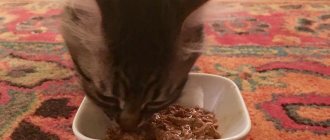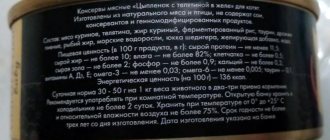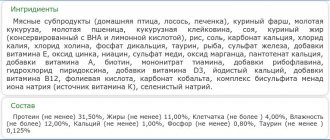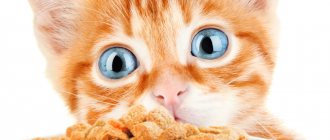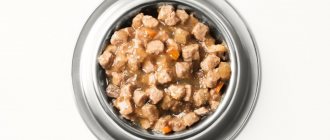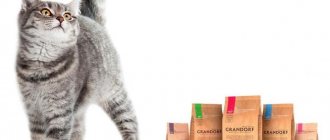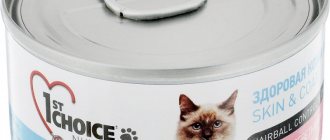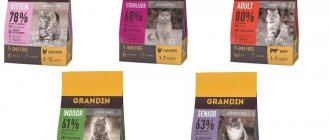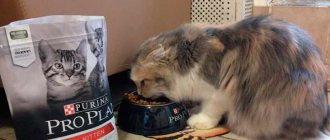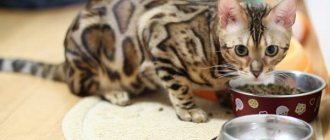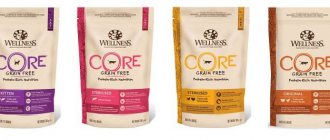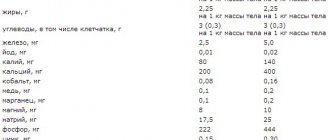If your cat is constipated, treatment should begin with a change in diet. Quite often, in the absence of serious pathologies, this measure is enough to establish bowel movements. The first step is to introduce more fiber-rich foods into your cat's diet. Coarse plant fibers perfectly stimulate the intestines and make them contract.
The basic rules of the diet for constipation depend on the diagnosis. To diagnose it and prescribe appropriate treatment, you must contact a veterinary clinic.
Constipation due to pancreatitis and changing the cat's diet
One of the causes of constipation in a cat may be inflammation of the pancreas - pancreatitis. This disease can occur in isolation, but more often it indicates other gastrointestinal pathologies. The disease is manifested by alternating constipation and diarrhea, vomiting after eating. The cat has a bloated stomach, which also hurts. With this disease, the following feeding rules must be observed:
- exclusion of fatty foods from the diet;
- It is strictly unacceptable to give an animal fried food, especially from the human table;
- milk and dairy products are excluded;
- the bulk of the diet should be meat by-products, as well as fiber-rich vegetables;
- Meat should not be given raw, it must be cooked.
Also read the article about what you should never feed cats.
The doctor also prescribes drug treatment for pancreatitis. The tablets should be given to the cat with food. It is also recommended to conduct a course of vitamin and mineral supplementation.
Natural products for constipation in cats
The diet and the list of prohibited and permitted foods can vary greatly depending on the causes of constipation.
Unloading
Prescribed for blockage of the gastrointestinal tract, as well as after operations and intestinal lavage. It can also be used for obesity. But with the difference that when there is a blockage, the diet goes towards a normal diet, and when you are overweight – towards a low-calorie diet.
The diet involves feeding on a schedule:
| Day | Meals | Diet |
| 1 | 5 | Warm double boiled meat broth |
| 2-3 | 3-4 | Raw eggs and broth |
| 3-4 | 2-3 | Rice and buckwheat porridge with water and some boiled lean meat |
| 4-6 | 2 | Porridge with milk and meat. Be sure to include "Bifidumbacterin". |
| 7-9 | 2 | Boiled vegetables are added to the porridge: cucumbers, carrots, lettuce, onions |
| 9-10 | 2 | Regular diet |
Diet for flatulence
With flatulence, you need to reduce gas formation in the intestines. This diet is also recommended for constipation of unknown etiology. Include more foods that irritate the intestinal wall, as well as coarse fibrous foods. Completely exclude foods that can stimulate fermentation and rotting. The food is not crushed to create more fiber; it is often steamed. It is advisable to give vegetables raw in the form of small cubes, and meat after freezing for 2-3 days.
The diet should consist of the following foods:
- vegetable oil (soldered in its pure form by force through a syringe);
- lean meat: beef, rabbit, turkey, lamb, chicken;
- meat by-products: kidneys, heart, lungs, tripe, udder;
- lean fish: cod, flounder, halibut, bream, perch, pike perch, pike;
- porridge with milk from buckwheat, millet, barley;
- non-acidic cottage cheese (calcined);
- fermented milk products (ryazhenka, kefir);
- vegetables: cauliflower, cucumbers, tomatoes, broccoli, zucchini, carrots, lettuce;
- cabbage soup, borscht
Prohibited products:
- fatty meat (pork);
- fatty fish: trout, salmon, herring, sardine, tuna, saury, anchovy;
- sausages and other semi-finished meat products;
- sour cottage cheese;
- boiled and fried eggs;
- rice, semolina;
- carbohydrate foods: horns, noodles;
- vegetables: turnips, potatoes, radishes, beets;
- beet and pea soup;
- confectionery and flour products.
Low calorie diet
Recommended for obesity and pancreatitis. Its task is to reduce the calorie content of food and relieve the gastrointestinal tract. At the same time, all proteins, amino acids, vitamins and minerals should be contained in the diet in normal quantities. Reduce the content of spices, as they stimulate appetite. If you are obese, vegetables can be given raw and meat can be frozen for 2-3 days. But with pancreatitis, food must be boiled, and enzymatic preparations are also given. There is no need to grind the products.
The diet should consist of the following foods:
- lean meat: beef, rabbit, turkey, lamb, chicken;
- meat by-products: kidneys, heart, lungs, tripe, udder;
- lean fish: cod, flounder, halibut, bream, perch, pike perch, pike;
- kefir, low-fat cottage cheese;
- egg white (without yolk, can be mixed with vegetables);
- water porridge from buckwheat, pearl barley, barley;
- vegetables: cauliflower, cucumbers, tomatoes, broccoli, zucchini, carrots, lettuce;
- low-fat soups (chicken or fish) with vegetables, but without beets or potatoes.
It is necessary to completely exclude from the diet:
- fatty meat (pork);
- fatty fish: trout, salmon, herring, sardine, tuna, saury, anchovy;
- sausages and other semi-finished meat products;
- milk and fatty dairy products: cottage cheese, cheese, cream;
- high-calorie porridges from rice, semolina, millet, oats;
- pasta and horns;
- soups;
- confectionery and flour products.
High calorie diet
It is necessary for constipation from cachexia, exhaustion after helminthiasis. You can’t take a high-calorie diet as an argument that “anything is possible.” You need to understand that after exhaustion, the animal’s resources are limited; it will not be able to cope with excessively fatty or rough food. Feed the cat often, but not much. The products must be boiled and chopped well.
The diet can be composed of products:
- meat: beef, chicken;
- meat by-products: liver, kidneys, heart, bones, tripe;
- medium-fat fish: pink salmon, herring, salmon;
- kefir, cottage cheese with medium and high fat content;
- boiled and fried eggs;
- porridge with milk from buckwheat, rice, oats;
- cabbage soup, borscht, meat soup.
It is necessary to limit the intake of such products:
- sausages and other semi-finished meat products;
- milk;
- pasta and horns;
- confectionery and flour products.
Intestinal blockage as a cause of constipation and proper nutrition
If the cause of constipation is a blockage in the intestines, this causes great suffering to the cat. As a rule, her stomach is swollen, there is colic, and she vomits after eating. If defecation occurs, it is in small portions and blood impurities may be found in the stool. In such cases, veterinarians recommend an enema, intestinal lavage, and drug treatment. For better fecal movement, you can give your cat a little vegetable oil (2-3 drops per meal). To solve the problem of constipation, it is necessary to make the following changes in diet:
- normalization of the ratio in the diet of BZHU;
- Be sure to include vegetables containing fiber in your diet;
- food should be well chopped, thermally processed, and have a normal temperature.
Cats with these problems definitely need to drink plenty of water.
Special dry food for constipation in cats
For constipation, the following special foods are recommended:
- ShinyCat with tuna and grass. It is made from tuna, chicken, shrimp, crab and natural dried herbs. The food is recommended for constipation due to helminthiasis and cachexia. The composition contains a lot of proteins, moderate fat content, and a large amount of fiber.
- Hills Prescription Diet Feline w/d. The food is balanced with a huge number of nutrients. Contains chicken and turkey, fiber, rice and corn. The product is enriched with beta-carotene, omega-3, antioxidants and minerals: magnesium, potassium, sodium, calcium. Can be used for constipation of any etiology.
- Eukanuba Intestinal for cats. It is recommended for gastroenteritis, pancreatitis, obesity, as well as after intestinal blockage and abdominal surgery. It contains chicken and turkey, egg whites, a large amount of fiber, probiotics, minerals and vitamins. Dry and wet food are available for sale.
- Hill's i/d for cats. It is recommended for diseases of the gastrointestinal tract, pancreatitis, obesity, and also after surgery in the abdominal area. Contains chicken and turkey, corn and rice, cellulose, various antioxidants, healthy fats, amino acids, vitamins and minerals. You can find dry and wet food in stores.
- Royal Canin Gastro Intestinal for cats. It is recommended for inflammatory diseases of the gastrointestinal tract, as well as constipation caused by cachexia and helminthiasis. The food is contraindicated for pancreatitis. The composition contains proteins, meat from various animals (including pork), prebiotics, fish oil, fiber, omega-3, vitamins and minerals.
Diet for obesity as a cause of constipation
If a cat has constipation, not accompanied by other symptoms (vomiting, restlessness, blood in the stool), while she is overweight and moves little, then the reason is obesity. In this case, constipation occurs very often and lasts for a long time, so the cat definitely needs help. It is recommended to do enemas, and it is also recommended to achieve weight loss through diet. Its rules:
- reducing the proportion of simple carbohydrates in the diet;
- The cat should be fed only dietary varieties of meat and poultry (chicken, rabbit, beef, lean veal);
- the meat must be frozen well, and meat by-products must be given to the animal only in boiled form, having previously been scalded with boiling water;
- vegetables should be raw, as heat treatment can increase their calorie content.
An obese cat should be fed frequently, in small portions, so that it does not feel hungry and therefore does not have the desire to overeat. You should also involve your pet in outdoor games and create conditions for him to be active.
We recommend reading the article about a proper cat diet.
Supplements and Foods to Help Relieve Constipation
In addition to following a diet and taking medications prescribed by your doctor, certain food supplements can help your cat cope with constipation.
Experts recommend introducing magnesium-rich foods into your diet. This element promotes better bowel function by stimulating its contractile movements.
However, owners of neutered cats should remember that excess magnesium in the body significantly increases the risk of developing urolithiasis.
A good laxative is raw chicken liver. Also, with mechanical constipation, you can increase the proportion of fats in the diet for a short period of time. Lipids will make stool softer, making it easier to move through the digestive tract. It is not necessary to introduce fatty meats into the diet; it is better to provide her body with vegetable fats. To do this, add a few drops of olive or flaxseed oil to the food.
Many experts say that pumpkin is a good remedy for constipation. This vegetable contains coarse fibers that stimulate intestinal motility. There is no scientific evidence of the effectiveness of using pumpkin for constipation in cats, but experience shows that this method is safe and works well to cope with stool disorders.
In addition to pumpkin, you can give your cat other vegetables. Usually these animals do not like such food, especially if they are not accustomed to it from an early age. You can introduce vegetables into your diet by gradually adding them to cottage cheese, mixing them into meat dishes and porridges.
For good functioning of the intestinal tract, you can give your cat grass. In nature, they find the plants they need on their own. In an apartment, the pet is offered specially sprouted greens, which can be purchased at pet stores.
Many cats do not refuse sunflower seeds. There is no need to fry them; they should be given raw. You can mix them into food after grinding them first. The seeds contain a large amount of fats and vitamins that will help improve the digestion process.
To treat and prevent constipation, you can give your cat a decoction of flax seeds. This remedy helps both people and cats. The seed must be filled with water and boiled well, otherwise toxic substances will remain in the liquid that will harm the cat.
Bran also helps stimulate peristalsis. Once in the intestines, these products act like a brush, stimulating contractions of the intestinal walls. Wheat or oat bran is added little by little to main dishes.
Hill's Prescription Diet cat food reviews
Since Hill's food is very common, there are many reviews about it on the Internet. We've shared a few new ones we found below.
Customer Reviews
Marina writes:
This food was prescribed to us after an exacerbation of urolithiasis in a cat. We have been buying it for several years now, the cat eats it with great pleasure, and the attacks of the disease have subsided. The optimal size of the granules, the taste with chicken is what the cat likes best.
Victoria writes:
My cat is 14 years old. And 4 years ago, serious kidney problems began. I’ll say right away that the problems were not related to kidney stones (struvite). The pelvis in the kidneys began to collapse. Treatment at the veterinary clinic did not give lasting results. I just started surfing the Internet and found this food. The cat only eats it. His kidneys don't bother him anymore.
Ekaterina writes:
Excellent food! My picky eater eats it just fine. She was diagnosed with diabetes 2 months ago and immediately started feeding the cat this food + RK Diabetic liquid food. I was injected with insulin for 10 days and that’s it, my sugar returned to normal, I think that the food played a role in the treatment regimen.
The role of water in nutrition for constipation
One of the common causes of constipation in cats is dehydration. Evolutionarily, it so happens that cats have almost no feeling of thirst, but they need moisture just like all other living beings. Owners need to ensure that the cat always has access to fresh water.
It is especially important to monitor fluid intake for those who feed their pet dry food.
Cats do not like to drink very much, and if the animal refuses water, then you can pour liquid into its mouth in small portions. This must be done very carefully, making sure that the pet does not choke. For this purpose, you should use a special syringe (or a regular one, but without a needle).
Experts also recommend starting treatment for constipation by increasing the mass fraction of moisture in your pet’s diet. If a cat eats natural food, it usually does not have such problems. But lovers of dry food often suffer from constipation. In such cases, it is necessary to increase the proportion of wet canned food.
The fact is that in cats that constantly eat dry food, especially economy class food, their sugar levels rise significantly due to the excess intake of carbohydrates. The body tries to reduce it through frequent urination, which further increases dehydration.
Feeding cats for constipation
The main symptom of constipation is the inability or difficulty of defecation. When defecating, the animal strains its back, meows pitifully, and signs of intoxication are also observed. However, it is necessary to put your pet on a special diet even in pre-morbid conditions. It can be determined by the consistency and shape of the stool.
Important! The norm of defecation is once a day for adult animals and 2 times for kittens; old pets go once every 2 days.
Nutrition for constipation greatly depends on the cause and severity of the pathology. Normally, feces in cats look like soft pieces or “sausages” with a smooth surface and rounded edges. If you see that immediately after defecation the stool is dry, has cracks on its surface or has the shape of round dense nuts, then you need to put your pet on a diet.
All causes of constipation are divided into 2 types:
- Mechanical and anatomical. Constipation is caused by a tumor or foreign body. It also often occurs in pets who have a narrowing of the intestine due to scarring and other anatomical defects. The symptoms of this group are the rapid development of pathology and severe pain.
- Functional constipation. They arise due to intoxication, obesity, lack of water and various gastrointestinal diseases. The clinical picture of constipation in this group is often enriched with symptoms of various pathologies: pancreatitis, colitis, flatulence and others.
Important! There are many causes of constipation, so you should always consult a veterinarian. Diet is not a cure, and with mechanical intestinal obstruction it will not help at all.
Industrial feeds that normalize stool
For constipation, both acute and chronic, veterinarians recommend feeding your cat medicated food specifically designed to solve the problem. The most effective are the following products:
- Royal Canin FIBER RESPONSE;
- Royal Canin GastroIntestinal;
- ShinyCat Hill's;
- Eukanuba Intestinal;
- Hill's i/d;
- Hills Prescription Diet Feline w/d.
These foods contain all the substances necessary for the treatment and prevention of constipation: fatty acids, fiber, vitamins and minerals.
Having identified symptoms of constipation in a cat, the owner should immediately take measures to eliminate it. If the proposed remedies do not help, then you should show the animal to a veterinarian. It is not worth giving cats human laxatives: the dosages of the active ingredients in such medications are not designed for the weight and functioning of the animal’s body. This can only cause harm. You should examine your pet and strictly adhere to the veterinarian’s recommendations.
Special foods for cats with constipation, their advantages and disadvantages
If the natural process of bowel movement is disrupted, it is recommended to feed the cat with specialized food. Unlike natural food with insufficient dietary fiber, medicated food contains all the elements necessary to normalize the digestion process. The table provides information about the most popular and effective foods that help solve the problem of constipation in cats.
| Name of medicinal food | Compound | Duration of use | Advantages | Flaws |
| Royal Canin FIBER RESPONSE | Dehydrated poultry, rice, corn, wheat and corn gluten, psyllium husks and seeds, hydrolyzed animal proteins, chicory extract, powdered eggs, fish oil, yeast, soybean oil, yeast extract, marigold extract, fructooligosaccharides | 21-28 days |
| Among the disadvantages of the cream are the rather high price and the presence of contraindications (narrowing of the intestinal lumen, enlarged colon). Moreover, it is not suitable for continuous use. |
| Hills Prescription Diet Feline w/d | Chicken, turkey and corn gluten meal, corn, fiber, rice powder, hydrolyzed protein, soybean oil, animal fat, beta and L-carnitine, taurine, vitamins, trace elements, mixed tocopherols |
| High price |
Hills Prescription Diet Feline w/d
